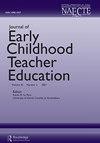Pedagogical adaptability as an essential capacity: reflective practice of applying theory to practice among first-year early childhood teachers during remote instruction
IF 1.3
Q3 EDUCATION & EDUCATIONAL RESEARCH
Journal of Early Childhood Teacher Education
Pub Date : 2022-12-01
DOI:10.1080/10901027.2022.2147879
引用次数: 4
Abstract
Situated within the theoretical framework of reflective practice, this phenomenological study investigated how early childhood teachers reflected on the ways in which they were able or unable to engage in developmentally appropriate practices during the first four months of the 2020–2021 school year in the context of COVID-19-induced remote instruction. The participants were nine first-year early childhood teachers (teaching preschool to third grade) in a northeastern state of the United States. These teachers (ages 22–32 years, M= 28 years) were all females, consisting of five Hispanics, two Caucasians, one Black, and one Mexican. Except for one Caucasian teacher educating all Caucasian children from affluent backgrounds, the other eight teachers were teaching children from mostly ethnic/racial minority and low-income backgrounds. The data were collected from interviewing each teacher virtually via Zoom for 1.5 hours. A thematic analysis of the data was conducted. The findings revealed four salient themes: (1) theory-practice consonance, (2) theory-practice dissonance, (3) pedagogical challenges due to contextual constraints, and (4) pedagogical adaptability emanating from reflective practice. Collectively, the affordances and constraints engendered by the remote environment seemingly created both a fluid and a constricted space for the teachers to apply theory (e.g., developmentally appropriate practice) to practice. The findings of this study yielded important implications for preparing preservice teachers in teacher education programs and supporting in-service teachers in professional development activities. © 2022 NAECTE.作为基本能力的教学适应性:一年级幼儿教师远程教学中理论与实践的反思性实践
这项现象学研究位于反思实践的理论框架内,调查了幼儿教师在2020-2021学年前四个月期间,在COVID-19引发的远程教学背景下,如何反思他们能够或不能参与适合发展的实践。参与者是美国东北部一个州的九名一年级幼儿教师(从学前班到三年级)。这些教师(年龄22-32岁,M=28岁)均为女性,包括五名西班牙裔、两名高加索人、一名黑人和一名墨西哥人。除了一名高加索教师教育所有富裕背景的高加索儿童外,其他八名教师主要教育少数民族/种族和低收入背景的儿童。这些数据是通过Zoom虚拟采访每位教师1.5小时后收集的。对数据进行了专题分析。研究结果揭示了四个突出的主题:(1)理论与实践的和谐,(2)理论与实际的不和谐,(3)情境约束带来的教学挑战,以及(4)反思实践产生的教学适应性。总的来说,远程环境产生的可供性和约束似乎为教师将理论(例如,适合发展的实践)应用于实践创造了一个流动和受限的空间。这项研究的结果对教师教育项目中的职前教师的准备工作和支持在职教师的专业发展活动产生了重要影响。©2022 NAECTE。
本文章由计算机程序翻译,如有差异,请以英文原文为准。
求助全文
约1分钟内获得全文
求助全文
来源期刊

Journal of Early Childhood Teacher Education
EDUCATION & EDUCATIONAL RESEARCH-
CiteScore
2.20
自引率
16.70%
发文量
27
期刊介绍:
The Journal of Early Childhood Teacher Education, the official journal of the National Association of Early Childhood Teacher Educators, publishes original manuscripts, reviews, and information about association activities. Its purpose is to provide a forum for consideration of issues and for exchange of information and ideas about research and practice in early childhood teacher education. JECTE welcomes research reports, position papers, essays on current issues, reflective reports on innovative teacher education practices, letters to the editor and book reviews.
 求助内容:
求助内容: 应助结果提醒方式:
应助结果提醒方式:


